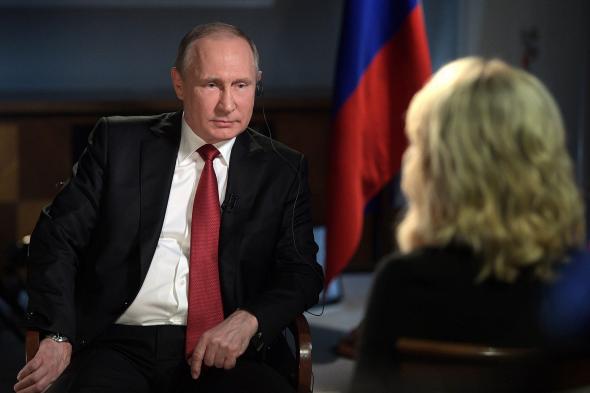Megyn Kelly is in her default interviewing mode: poised yet concerned. She sits across from Russian President Vladimir Putin—one of several face-to-face conversations with him she arranged to kick off her new prime-time NBC show, Sunday Night With Megyn Kelly, which premiered this weekend—and asks him about Moscow’s role in the 2016 election hacks.
The 17 U.S. intelligence agencies pointing at Russia “have been misled,” Putin stonewalls. He suggests that the same CIA operatives who orchestrated John F. Kennedy’s assassination from within American borders may have also framed the Kremlin. Or the culprit could have been Kelly’s 3-year-old daughter. He magnanimously claims that “I don’t want to hurt anyone’s feelings,” but Washington “everywhere, all over the world, actively interferes with the electoral campaigns of other countries.” Kelly presses him. “With respect, sir, that sounds like a justification.”
“It sounds like a statement of fact,” Putin corrects. (Several times over the course of the interview, he tears his earpiece out of his ear in distracted aggravation.) Kelly tries to elucidate the ties between Ambassador Kislyak and the Trump machine, including lieutenants Jared Kushner and Michael Flynn, and it is like attempting to wring revelations from a lamp. “You created a sensation out of nothing,” he says. “And out of this sensation, you turned it into a weapon of war against the current president. Well, this is, you know, you’re just, you people are so creative over there. Good job. Your lives must be boring.”
Kelly must have anticipated that Putin would wave aside her queries like so much constitutional fine print. Instead of forcing him through a deposition—chasing him with follow-ups, digging for fresh scoops—she lightly poses the questions any responsible journalist would ask. She seems to want his high-handed evasions, spliced with her context-rich voice-over passages, to speak for themselves.
But for all its vinegar, it is stubbornly uninformative theater. Kelly comes across as a serious reporter—she has long been skilled at projecting “seriousness”—but not, in this case, an especially dogged one. Having (correctly) assumed that her subject won’t cooperate, she gives up on the prospect of finagling new facts from him. While Putin alternates between cat-got-the-canary smugness and flares of temper, Kelly recedes into the background. A pro-Trumper could probably interpret the exchange as a vehement rebuttal of the collusion theory. Most liberals will read it as star-imploding trolling on Putin’s part. What projects through regardless is the Russian leader’s heavy-lidded contempt for the interview he’s agreed to, and especially for the interviewer in front of him.
That, even more than the grabbiness of the headlines, is why Putin feels like the perfect sneering man to underestimate Megyn Kelly as she embarks on her first tentpole TV venture since leaving Fox News. Wooed away from the conservative network to the tune of $15 million–$20 million, Kelly had already burnished her feminist bona fides by challenging Trump during the Republican primary (he called her a “bimbo”) and speaking out against the culture of sexual harassment instigated by Roger Ailes. Now, Sunday Night—positioned, at 7 p.m., against the mainstream media colossus 60 Minutes—has a specific niche in mind. It wants to filter current events through Kelly’s Goldilocks brand of femininity: traditional but modern, tough but compassionate, beautiful but strong. The prototypical Kelly surrogate is an empowered white woman who really listens. Keenly intelligent, she knows how to think with her heart; her innate sensitivity and feminine je n’ais se quoi awaken in her a fierce moral clarity. And Putin, with his swagger and condescension, is the ideal foe, even if he’s a terrible interview.
After Putin, the show unveiled its B-story, about a corrupt pharmaceutical company that may be pressuring doctors to recklessly prescribe a dangerous drug. The investigative journalist Cynthia McFadden reports on a whistleblower, Patty, who took steps to get the CEOs of Insys Therapeutics charged with fraud, racketeering, and conspiracy. The reasonably compelling narrative has clear moral stakes, a “you go, girl” message, and a dollop of NBC’s characteristic sap. “I just want to tell everyone out there who’s been hurt, I am so sorry for any suffering and any pain,” Patty weeps. The next segment chronicles a white American woman who has relocated her family to Kenya in order to protect elephants from poachers. “Elephants are a matriarchal society,” the protagonist, a lieutenant colonel with an anti-terrorism background, explains raptly. Then there’s Megyn: nodding, looking grave and hopeful. Forgive me if I sound cynical, but it’s easy to figure out where you stand on dastardly pharmaceutical companies and baby elephants. It’s harder to use your platform on a middle-of-the-road network to actually change the conversation around the biggest news events of the day.
Of course, if Kelly’s message of female conviction, perseverance, and compassion takes hold in conservative minds, her seat on NBC might yet allow her to do some good. The final segment of Sunday Night With Megyn Kelly, which lasted all of five minutes, was a charming video called “Kids Corner.” It featured cute children opining on the importance of manners while clips of MSNBC and The O’Reilly Factor played darkly in the background. Kelly was making a sly point about the civility she hoped to nurture on her show and in the world. Her newsmagazine, she implied, would enshrine more dignified and adult values than its competitors. But it wasn’t so long ago that Kelly herself was blustering about the race of Santa Claus. I hope her performative toughness translates into a real willingness to hold the Trump administration accountable and doesn’t just reveal a talent for loudly expending moral capital on all the least controversial positions. Kelly’s feminism has long had a whiff of convenience about it. Will her politics, too?
